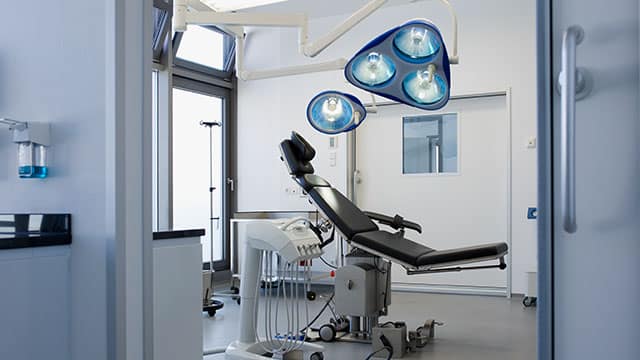You might be thinking, "I brush my teeth and I floss, so why do I need to visit the dentist? What does a dentist actually do?" The truth is that brushing and flossing aren't enough! Beyond good oral hygiene, regular dental examinations prevent most dental diseases. So if you're curious about what to expect when visiting the dentist for a checkup, we've got you covered. Here's what goes down at the dentist (and we'll cover each in greater detail too): dental x-rays, oral exams, cancer screenings, scaling and polishing, fluoride, sealants, and oral care education for home.
Oral Examination
During a routine checkup, a dental hygienist or dentist will examine your mouth and teeth and look for basic oral hygiene. Their goal is to pinpoint any areas to address for potential care, like:
- Decay detection: Your dentist and dental hygienist will look for any visible signs of tooth decay. They'll also look to see if any tooth enamel has softened. Why? Because they want to prevent cavities!
- Gum check: To determine your gums' health, your dentist or dental hygienist will measure the pockets around your teeth to see if any bone has been lost to gum disease.
- Bite evaluation: Your dentist or dental hygienist will also evaluate your bite and look for any red flags to protect your dental health.
- Teeth development check (for children): Dentists or dental hygienists closely monitor children's teeth development and eruption pattern so orthodontic referrals can be made if needed.
Dental X-Rays
Routine dental X-rays are frequently taken at checkup visits. They're very valuable in that they can reveal cavities between your teeth. They also can provide information about the health and height of the supporting bone around the teeth. Further, they show the dentist the position of developing teeth in children.
There are many types of dental X-rays. Your dentist will decide which X-rays are needed for you to get the information they need about your teeth. FYI: dental hygienists are often responsible for taking X-rays.
Oral Cancer Screening
Another important thing that dentists do is check for oral cancer. As with all cancer, early detection is essential! That's why dentists do cancer screenings at every checkup.
Let's review what happens during oral cancer screening, so you know what to expect. During the screening, your dentist will hold your tongue with gauze and then check your tongue and mouth for any signs or symptoms. They'll also feel your jaw and neck.
Scaling and Polishing
Dentists recommend having your teeth routinely cleaned to keep your gum tissue healthy and to prevent periodontal disease. The dentist or a dental hygienist will use instruments to scale off any hardened plaque (called tartar). Next, they'll polish your teeth with a special paste to remove stains and polish the enamel. They may also floss your teeth. There's nothing like the squeaky-clean feeling in your mouth after a professional cleaning! That's for sure.
Fluoride Treatment
Fluoride treatments are usually given after the teeth have been cleaned. They are most often given to children, but they're also helpful adults in preventing decay. The American Academy of Pediatric Dentistry (AAPD) recommends topical fluoride treatments for children to strengthen their tooth enamel during the years when they're most prone to cavities.
A fluoride treatment may come in the form of a gel, rinse, foam, or varnish. And it may be applied with a swab, brush, tray, or mouthwash. These treatments contain a much greater amount of fluoride than toothpaste, and they only take a few minutes to apply. You will likely be asked to wait 30 minutes before eating or drinking after the treatment so that the fluoride can properly absorb into your teeth. So, we recommend eating before your appointment if you can.
Sealant Application
A dental sealant is a very thin coating painted on the chewing surfaces of teeth, usually the molars (back teeth), to prevent decay. A sealant can last from five to 10 years. Usually, the procedure is given to children and teens. But adults with no decay or fillings in their molars can benefit from it too.
The procedure is simple and painless. An acid solution is applied to the teeth, making the surface rough so that the sealant can bond to it. The sealant is then painted on the enamel. Sometimes a special light is used to harden the sealant. And done!
Home Care Instruction
During your visit, the dentist or dental hygienist will go over your specific home care instructions. This includes proper brushing and flossing techniques. It may also include food and diet recommendations, specifically focused on your oral health. This is always a great time to ask questions about your oral health! If anything is on your mind about your oral health, just ask.
Now you have a good idea about what happens at the dentist during a routine visit. From the oral exam to the sealant treatment, you know what to expect. Visiting the dentist regularly is essential in making sure your oral health is on point. It will not only leave your teeth feeling clean, but you'll also have the benefit of X-rays, a general oral exam as well as an oral cancer exam, and maybe even fluoride and sealants. So, if it's been a while, call your dentist today. Your teeth will appreciate it!
Oral Care Center articles are reviewed by an oral health medical professional. This information is for educational purposes only. This content is not intended to be a substitute for professional medical advice, diagnosis or treatment. Always seek the advice of your dentist, physician or other qualified healthcare provider.
ORAL HEALTH QUIZ
What's behind your smile?
Take our Oral Health assessment to get the most from your oral care routine
ORAL HEALTH QUIZ
What's behind your smile?
Take our Oral Health assessment to get the most from your oral care routine















